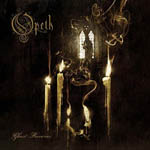|
OPETH ‘Ghost Reveries’ Roadrunner RR81232 (2005)

Over an already long career spanning seven releases,
Opeth has managed to build a strong, fanatical
following of metal and non-metal fans alike, starting
out ten years ago with the sort that are tapped right
into the metal underground and who notice any new
bands showing promise on their first tour of Britain’s
lucrative toilet circuit.
As Opeth have gone along, they’ve slowly but steadily garnered more and more
attention, accruing fans not only from the extreme and
progressive metal fraternities, but also lately from
more traditional progressive music backgrounds, this
helped in no small part by Steven Wilson’s (Porcupine
Tree, No-Man, Blackfield) production duties and their
“mellow” Damnation release of 2003, which saw them
charting for the first time on the American Billboard
album chart.
The year 2005 finds Opeth poised not quite for world
domination, but certainly for making sure their name
is on the lips of just about every metal fan who
follows developments even casually. Following the
absorption of their former label, Music For Nations,
into the mighty black-hole that is BMG, Opeth was
temporarily without a contract, and eventually signed
to Roadrunner, the only real contender if they were to
maintain the upward curve of their recent trajectory.
After the acoustic experimentation of their
aforementioned 2003 release, initial assumption is
that it’s back to more familiar waters with Ghost
Reveries, but the truth is that their sound has been
expanded by the addition of former touring keyboardist
and now permanent member, Per Wiberg (Spiritual
Beggars). One thing to particularly strike me after
my first listen is the confidence that singer /
guitarist / creative force Mikael Åkerfeldt seems to
have gained in his singing, wheeling out the “clean
passages” (yes, he growls too, since this band’s roots
straddle many styles, one being death metal) more
often than ever before.
All of the speculation after Damnation’s release of
Opeth’s direction changing permanently to focus on the
more commercially-viable acoustic / 70s prog sound has
been thankfully proved wrong, and I say this not
because Opeth doesn’t do acoustic well au contraire,
they do it more authentically, beautifully and with a
fully-realised appreciation of the required
compositional style than other bands could dream of –
but because they’ve added yet more strings to their
already-well-stocked bow and are continuing to meld
seemingly uncongruous musical styles through the use
of sudden, majestic transitions and occasional abrupt
180-degree shifts. It’s these transitions, the
moments that hold it all together, often achingly
beautiful, that would be tragically lost if Opeth were
to focus on one style.
The second song of the album, “The Baying Of The
Hounds”, opens with a riff accompanied by some lovely
Green Carnation-esque Hammond work by Wiberg – the
first real evidence that his addition is helping push
this band even further forward. Halfway through the
song, the Åkerfeldt ear is well in evidence, with an
absolutely mind-bending, infernal-sounding chord
progression that, with full orchestral backing, would
sound fitting if it were one day used as the theme
music to Satan’s descent to Earth on a horse-drawn
chariot, his minions having earlier discreetly placed
speakers and a sound-system on a nearby rooftop.
Track three, “Beneath The Mire”, opens with the sort
of organ-led intro that one could imagine played in
the marquee of a travelling freakshow by a naked
midget sitting comfortably at his organ next to the
spotlit stage. The singing on this track is a
highlight, Åkerfeldt dazzling alternately with his
vocal and guitar melodies. “Atonement” is another
high point, with its peaceful keyboard-oriented ending
that recalls Chroma Key’s first album, “Dead Air For
Radios”.
“Reverie / Harlequin Forest” surges forward from the
get-go with a relentless pace and scintillating,
unhinged drumming by Martin Lopez, whose name is
becoming increasingly well-known in drumming circles.
“Hours Of Wealth”’s washes of keyboards slowly build,
their cinematic quality adding a new dimension to
Opeth’s sound, not to mention the soulful, harmonised
singing employed when the solitary verse arrives, and
the Gilmour-ish, bluesy ending solos where it seems
Åkerfeldt’s almost deliberately avoiding the delay
effect that, in the listener’s (and Floyd fan’s) mind,
the solos seem to cry out for.
“The Grand Conjuration” was chosen by Roadrunner as
the lead-off single for this album, which is a shame
as it’s probably the weakest track. The video that
was filmed, however, wasn’t all bad, featuring Gene
Hoglan (Strapping Young Lad, ex-Death) on drums (Lopez
had taken ill and flown home to Sweden) and a superb
visual accompaniment to the heavy, growling section
around the middle of the song which I can only
describe as sounding like what you’d expect to hear if
you listened in on the Devil singing in the shower.
Opeth’s guitarists again show inventive use of their
instruments on this track, threatening to move into
guitar-hero territory with their tapped solos.
The album closes with “Isolation Years”, a more
obvious choice for a single (if there had to be one at
all) and another good showing by keyboardist Wiberg in
creating atmospheres for his new band.
All in all, a good, strong release, but a criticism
that has been (justly) levelled at this album and
Opeth’s “new” (-ish) direction is that the cold,
sinister feeling that was there before, and relished
by many, including me, seems to be gone. As this is
their first recording as a five-piece, I am prepared
to wait and see how things turn out next time and in
the meantime I am just thankful that in the world of
music, where often the most innovative and talented
are the least successful, there seems to be some fair
reward coming their way, and if that’s the price of
“selling out” by signing to a large label, most famous
for having Slipknot on its roster, then so be it, I’m
with Opeth.
****
Review by Nick Calverey

|

